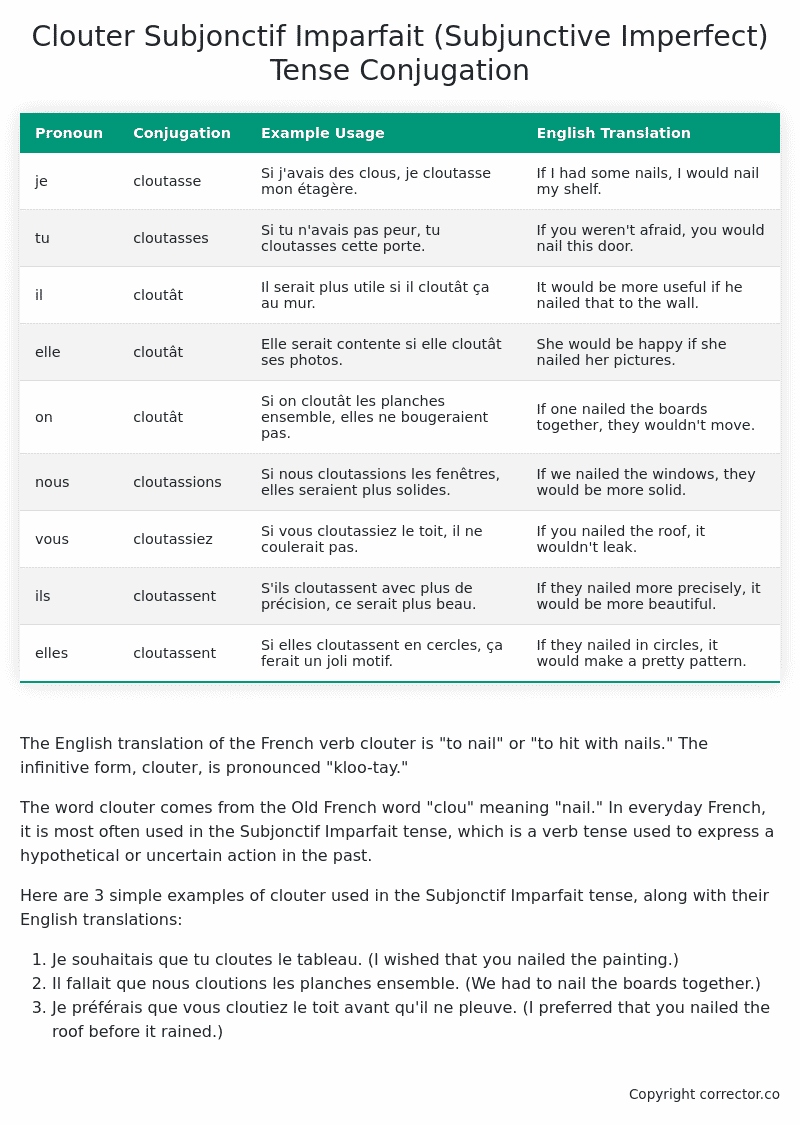Subjonctif Imparfait (Subjunctive Imperfect) Tense Conjugation of the French Verb clouter
Introduction to the verb clouter
The English translation of the French verb clouter is “to nail” or “to hit with nails.” The infinitive form, clouter, is pronounced “kloo-tay.”
The word clouter comes from the Old French word “clou” meaning “nail.” In everyday French, it is most often used in the Subjonctif Imparfait tense, which is a verb tense used to express a hypothetical or uncertain action in the past.
Here are 3 simple examples of clouter used in the Subjonctif Imparfait tense, along with their English translations:
- Je souhaitais que tu cloutes le tableau. (I wished that you nailed the painting.)
- Il fallait que nous cloutions les planches ensemble. (We had to nail the boards together.)
- Je préférais que vous cloutiez le toit avant qu’il ne pleuve. (I preferred that you nailed the roof before it rained.)
Table of the Subjonctif Imparfait (Subjunctive Imperfect) Tense Conjugation of clouter
| Pronoun | Conjugation | Example Usage | English Translation |
|---|---|---|---|
| je | cloutasse | Si j’avais des clous, je cloutasse mon étagère. | If I had some nails, I would nail my shelf. |
| tu | cloutasses | Si tu n’avais pas peur, tu cloutasses cette porte. | If you weren’t afraid, you would nail this door. |
| il | cloutât | Il serait plus utile si il cloutât ça au mur. | It would be more useful if he nailed that to the wall. |
| elle | cloutât | Elle serait contente si elle cloutât ses photos. | She would be happy if she nailed her pictures. |
| on | cloutât | Si on cloutât les planches ensemble, elles ne bougeraient pas. | If one nailed the boards together, they wouldn’t move. |
| nous | cloutassions | Si nous cloutassions les fenêtres, elles seraient plus solides. | If we nailed the windows, they would be more solid. |
| vous | cloutassiez | Si vous cloutassiez le toit, il ne coulerait pas. | If you nailed the roof, it wouldn’t leak. |
| ils | cloutassent | S’ils cloutassent avec plus de précision, ce serait plus beau. | If they nailed more precisely, it would be more beautiful. |
| elles | cloutassent | Si elles cloutassent en cercles, ça ferait un joli motif. | If they nailed in circles, it would make a pretty pattern. |
Other Conjugations for Clouter.
Le Present (Present Tense) Conjugation of the French Verb clouter
Imparfait (Imperfect) Tense Conjugation of the French Verb clouter
Passé Simple (Simple Past) Tense Conjugation of the French Verb clouter
Passé Composé (Present Perfect) Tense Conjugation of the French Verb clouter
Futur Simple (Simple Future) Tense Conjugation of the French Verb clouter
Futur Proche (Near Future) Tense Conjugation of the French Verb clouter
Plus-que-parfait (Pluperfect) Tense Conjugation of the French Verb clouter
Passé Antérieur (Past Anterior) Tense Conjugation of the French Verb clouter
Futur Antérieur (Future Anterior) Tense Conjugation of the French Verb clouter
Subjonctif Présent (Subjunctive Present) Tense Conjugation of the French Verb clouter
Subjonctif Passé (Subjunctive Past) Tense Conjugation of the French Verb clouter
Subjonctif Imparfait (Subjunctive Imperfect) Tense Conjugation of the French Verb clouter (this article)
Subjonctif Plus-que-parfait (Subjunctive Pluperfect) Tense Conjugation of the French Verb clouter
Conditionnel Présent (Conditional Present) Tense Conjugation of the French Verb clouter
Conditionnel Passé (Conditional Past) Tense Conjugation of the French Verb clouter
L’impératif Présent (Imperative Present) Tense Conjugation of the French Verb clouter
L’infinitif Présent (Infinitive Present) Tense Conjugation of the French Verb clouter
Struggling with French verbs or the language in general? Why not use our free French Grammar Checker – no registration required!
Get a FREE Download Study Sheet of this Conjugation 🔥
Simply right click the image below, click “save image” and get your free reference for the clouter Subjonctif Imparfait tense conjugation!

Clouter – About the French Subjonctif Imparfait (Subjunctive Imperfect) Tense
Formation
Common Everyday Usage Patterns
Interactions with Other Tenses
Subjonctif Présent
Indicatif Passé Composé
Conditional
Conditional Perfect
Summary
I hope you enjoyed this article on the verb clouter. Still in a learning mood? Check out another TOTALLY random French verb conjugation!


